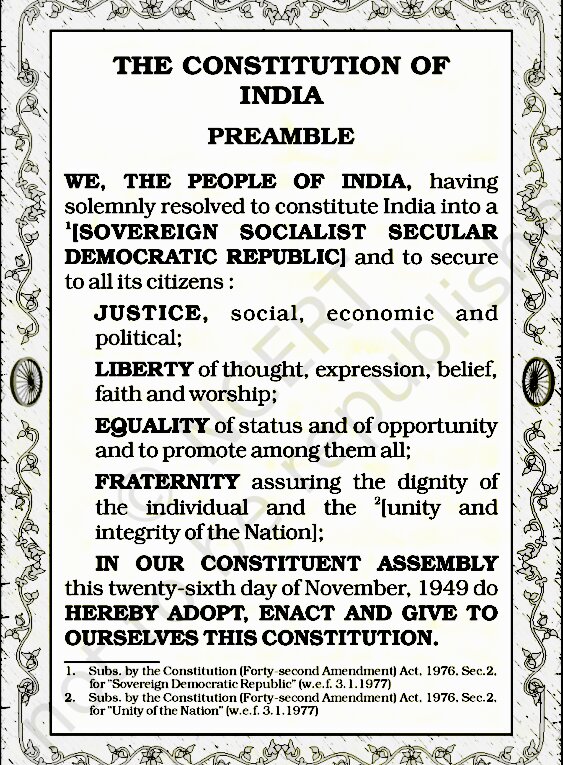Preamble of the Indian Constitution: Meaning, Significance & Historical Background
Focus Keyphrase: Preamble of the Indian Constitution
Introduction
The Preamble of the Indian Constitution is much more than a ceremonial introduction. It encapsulates the essence, philosophy, and guiding principles of the Indian Constitution. Drafted with precision and deep thought, the Preamble is a powerful statement that outlines India’s foundational values such as justice, liberty, equality, and fraternity.
It is often referred to as the soul of the Constitution, and rightly so. The Preamble provides the ideological framework and moral commitment that the Constitution is intended to achieve.
👉 Read the Constitution of India – Government of India
Text of the Preamble
“WE, THE PEOPLE OF INDIA, having solemnly resolved to constitute India into a SOVEREIGN SOCIALIST SECULAR DEMOCRATIC REPUBLIC and to secure to all its citizens:
JUSTICE, social, economic and political;
LIBERTY of thought, expression, belief, faith and worship;
EQUALITY of status and of opportunity; and to promote among them all
FRATERNITY assuring the dignity of the individual and the unity and integrity of the Nation;IN OUR CONSTITUENT ASSEMBLY this twenty-sixth day of November, 1949, do HEREBY ADOPT, ENACT AND GIVE TO OURSELVES THIS CONSTITUTION.”
Historical Background of the Preamble
The idea of a preamble was inspired by the Constitution of the United States, which also begins with a similar introductory statement. The Preamble to the Indian Constitution was drafted after extensive debate and deliberation by the Constituent Assembly of India, led by Dr. B.R. Ambedkar.
Key Dates:
-
Drafting Started: December 1946
-
Adopted by the Assembly: November 26, 1949
-
Came into Effect: January 26, 1950
Key Words and Their Meaning in the Preamble
🟡 Sovereign
India is independent in both internal and external affairs. No foreign power can dictate terms to the Indian government.
🟡 Socialist
This implies that wealth should be distributed equally and not concentrated in a few hands. It reflects economic and social justice.
🟡 Secular
India has no official state religion. Every citizen has the freedom to practice, propagate, and profess any religion.
🟡 Democratic
The government is elected by the people, for the people, and of the people. India follows universal adult franchise.
🟡 Republic
The head of the state (President) is elected and not a hereditary monarch.
Objectives Stated in the Preamble
✅ Justice: Social, Economic, and Political
Ensures the removal of inequalities in society and provides a fair legal framework.
✅ Liberty: Thought, Expression, Belief, Faith, and Worship
Every citizen has the freedom to form opinions and express them without fear.
✅ Equality: Status and Opportunity
No discrimination based on caste, religion, gender, or place of birth.
✅ Fraternity: Dignity of the Individual and Unity of the Nation
Encourages a sense of brotherhood among all citizens while respecting diversity.
👉 Explore Fundamental Rights – National Portal of India
Amendment to the Preamble
The 42nd Constitutional Amendment Act, 1976, added three new words:
-
Socialist
-
Secular
-
Integrity
This was done during the Emergency period under Prime Minister Indira Gandhi. The amendment emphasized India’s commitment to social and secular values and national unity.
👉 42nd Amendment Act – PRS Legislative Research
Is the Preamble Legally Enforceable?
In the landmark case of Kesavananda Bharati v. State of Kerala (1973), the Supreme Court of India held that:
-
The Preamble is an integral part of the Constitution.
-
It is not enforceable by courts (i.e., you cannot go to court claiming only Preamble violations).
-
However, it can be used to interpret ambiguous provisions of the Constitution.
👉 Kesavananda Bharati Case Summary – Legal Service India
Preamble vs Fundamental Rights
While Fundamental Rights are justiciable (i.e., can be enforced in court), the Preamble is non-justiciable. However, both are deeply interconnected. The Preamble acts as the philosophical foundation for interpreting these rights.
Importance of the Preamble in Contemporary India
-
Guiding Spirit for constitutional interpretation.
-
Acts as a moral compass during socio-political turmoil.
-
Reinforces secular and democratic values.
-
Provides direction to lawmakers and judiciary.
In today’s environment of religious polarisation, inequality, and political discord, the Preamble is a reminder of India’s core constitutional values.
Role of the Preamble in Judiciary
Courts in India often refer to the Preamble while deciding important constitutional matters. For example:
-
In S.R. Bommai vs Union of India (1994), the SC emphasized the secular character of the Constitution using the Preamble.
-
In Minerva Mills vs Union of India (1980), the Court ruled that the Constitution’s basic structure (including Preamble values) cannot be altered.
👉 Minerva Mills Case Summary – IndianKanoon
How Students and Citizens Can Use the Preamble
-
UPSC and Judiciary Exams: The Preamble is a common topic.
-
Debates and Public Discourse: Reference to constitutional values strengthens arguments.
-
Legal Awareness: Understanding your rights and responsibilities.
Conclusion
The Preamble of the Indian Constitution is not just an introduction—it’s a declaration of India’s intent and commitment to uphold the dignity of every individual. It reflects our aspiration for justice, liberty, equality, and fraternity and serves as a beacon of hope and unity.
In these turbulent times, returning to the ideals enshrined in the Preamble can help us reaffirm our commitment to constitutional democracy and inclusive development.

